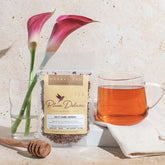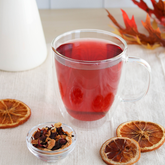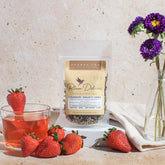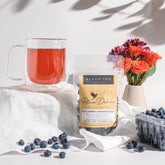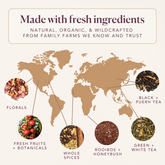
Please note that I am not a doctor, nor does my beginner certification in herbalism qualify me to provide health advice. Please seek the help of a medical professional before taking any herbs for medicinal reasons.
Chamomile
There are two main types of chamomile used in herbal teas and medicines: Matricaria recutita (German chamomile) and Chamaemelum nobile (Roman chamomile). This daisy-like little flower has mild sedative, anti-inflammatory, and anti-spasmodic properties. It's most often used as a sleep aid, but can also help stomach ulcers, cramps, gas, and other gut-related discomfort; soothe skin inflammation from burns, psoriasis, and eczema; and ease sore throats and colds.
Moderately interacts with: contraceptive pills, estrogens, liver medications, sedatives, blood thinners
Mildly interacts with: aspirin and NSAIDs
Teas:
Calm Chamomile Bloom
Cozy Tranquil Dreams
Cuddletime
Tranquil Peach
Elderberry + Elderflower
Elderberries and elderflowers are the fruit and flowers, respectively, of the elder tree or shrub (Sambucus nigra). The berry is said to be anti-inflammatory, anti-viral due to its high bioflavonoid content, and full of immunity-boosting antioxidants. Elderberries are often cooked down into a syrup that is used to fight colds, flu, and fever. The flowers, which are most famously used to make a delicious cordial, have anti-catarrhal properties, meaning they help to clear up things like congestion and runny nose.
Moderately interacts with: immunosuppressants
Teas:
Evening In the Garden
Just Elderberry
Just Elderflower
Slowly Unwind
Self Care

Ginger
Perhaps best known for its anti-nausea effects, Zingiber officinale is full of gingerol, which has anti-inflammatory and antioxidant properties. Along with gut-soothing power, ginger can also be used for muscle, joint, and menstrual pain. Some studies even say it helps lower blood sugar and cholesterol.
Moderately interacts with: blood thinners
Mildly interacts with: diabetes and high blood pressure medications
Teas:
Just Ginger
Rejuvenation Blend
Coconut Ginger Soother
Hibiscus
Blood red and refreshing, hibiscus (Hibiscus sabdariffa) is drunk as a traditional remedy in many cultures around the world. It's full of antioxidants and vitamin C, and has both anti-inflammatory and antibacterial properties. It is believed to help lower blood pressure and cholesterol, fight liver damage, and even prevent colds and the flu. Its cooling and hydrating effects can help reduce fever.
Mildly interacts with: acetaminophen (Tylenol)
Teas:
Happy Hour
Just Hibiscus

Lavender
By far one of the most well-known herbs, lavender comes in many varieties, including Lavandula angustifolia, L. stoechas, L. dentata, and L. multifida. It's actually a members of the mint family Lamiaceae, though you'd never guess from the taste or smell. Lavender is a strong nervine, meaning it affects the nervous system -- in this case, to sedative effect. Because of this it's most often used for relaxation and sleep and to reduce anxiety and stress. Combined with mint, it can help relieve headaches. Lavender is also believed to have anti-inflammatory, antiseptic, and anti-fungal properties.
Moderately interacts with: sedatives
Teas:
Vista Blend
Lemongrass
At this point, there have not been many studies on the benefits of lemongrass (Cymbopogon), but many believe it to have anti-inflammatory, antioxidant, and antibacterial properties. It's used to ease bloating, and some studies have said it may boost red blood cells and help lower cholesterol. We just really love the way it tastes.
No known interactions
Teas:
Healthy Wealthy Wise Herbal
Cozy Tranquil Dreams Herbal

Mint
The mint family (Lamiaceae) boasts some truly powerhouse herbs, including peppermint (Mentha x piperita) and spearmint (Mentha spicata). While it might be a gardener's headache, constantly spreading and reproducing at a rapid rate, mint is a truly fantastic plant. It contains rosmarinic acid, which makes it high in antioxidants and gives it anti-inflammatory properties. Its menthol content works as a nasal decongestant, which also combines with mint's anti-microbial benefits to soothe skin irritations like insect bites and rashes. But most people just use it to ease indigestion and gas.
Moderately interacts with: cyclosporine (Neoral, Sandimmune), medications changed by the liver
Mildly interacts with: antacids
Teas:
Refreshing After Dinner Mint
White Chocolate Peppermint
"Wise Counsel" Licorice Mint
Rosemary
Rosmarinus officinalis is yet another Lamiaceae member, and it does its family proud. Packed with iron, calcium, vitamin B-6, lots of antioxidants, and anti-inflammatory properties. Traditionally used for indigestion, some studies indicate the carnosic acid in rosemary may improve memory and brain health. Preliminary research shows it could even help fight tumors and cancer cells.
No known interactions
Teas:
Meadow Walk

St. John's Wort
Perhaps one of the most-studied plants on this herbal tea list, St. John's wort (Hypericum perforatum) is used in Europe to fight depression and anxiety. Like lavender, it's a powerful nervine, full of hypericin and hyperforin. Along with its mood-boosting effects, St. John's wort is commonly use to help with symptoms of menopause. Fair warning: It has a lot of possible drug interactions, so absolutely check with your doctor before consuming it regularly.
Majorly interacts with: anxiety medications like alprazolam (Xanax), certain contraceptive pills, cyclosporine (Neoral, Sandimmune), certain heart medications like digoxin (Lanoxin), and more. Full list here.
Teas:
Best Friend's Advice
Sage
Sage (Salvia officinalis) is another powerhouse in the mint family Lamiaceae. It's packed with antioxidant, anti-inflammatory, anti-fungal, and antimicrobial properties that make your holiday sage and apple stuffing sound downright healthy. In fact, it can help with stomach pain, gas, and bloating, so you should definitely add it to the menu. Sage is great for colds and cold sores, and it can help with menstrual pain and hot flashes, too.
Moderately interacts with: diabetes medications, seizure medications, and sedatives
Teas:
Healthy, Wealthy, & Wise
Sage Wellness
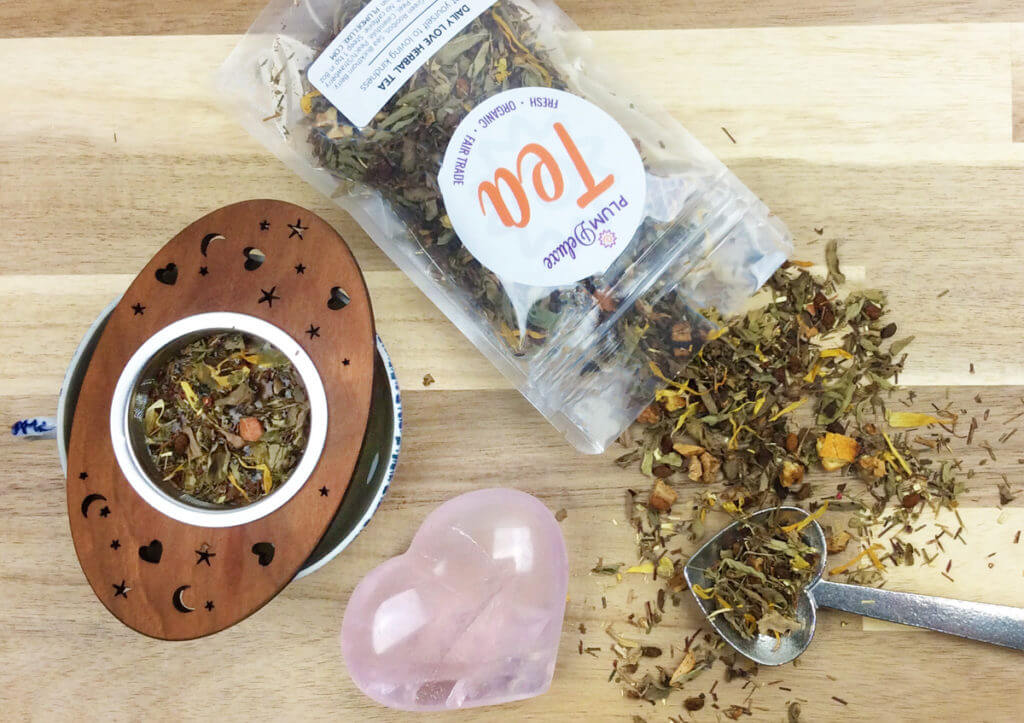
Tulsi/Holy Basil
Tulsi (Ocimum tenuiflorum) -- sometimes more commonly known as Holy Basil -- is an adaptogenic herb, meaning it adapts to give the body the effects it needs. Pretty neat, right? Tulsi also has anti-inflammatories and antioxidants, and is used for everything from lowering blood sugar to easing anxiety and stress to fighting the cold and flu. Studies are being done to check its affects on cancer. Unsurprisingly, it's another of mint's many cousins.
Moderately interacts with: blood clotting medications, pentobarbital
Teas:
Daily Love
Turmeric
Turmeric (Curcuma longa) has gotten a lot of press in recent years, mostly due to its supposed anti-inflammatory properties. While this member of the ginger family Zingiberaceae, does contain the anti-inflammatory curcuminoid called curcumin, it probably doesn't have enough concentration to give the much-touted benefits. The human body also doesn't absorb curcumin very well unless something with piperine -- like black pepper -- is added. Regardless, turmeric has been linked to improved brain function and lower risk of heart disease as well as possible cancer fighting and prevention. It's been used to treat arthritis and even depression.
Moderately interacts with: blood thinners
Teas:
Hello, Sunshine
Hopefully this herbal tea list has given you a better idea of the power in your cup. Now, go sip to your health!
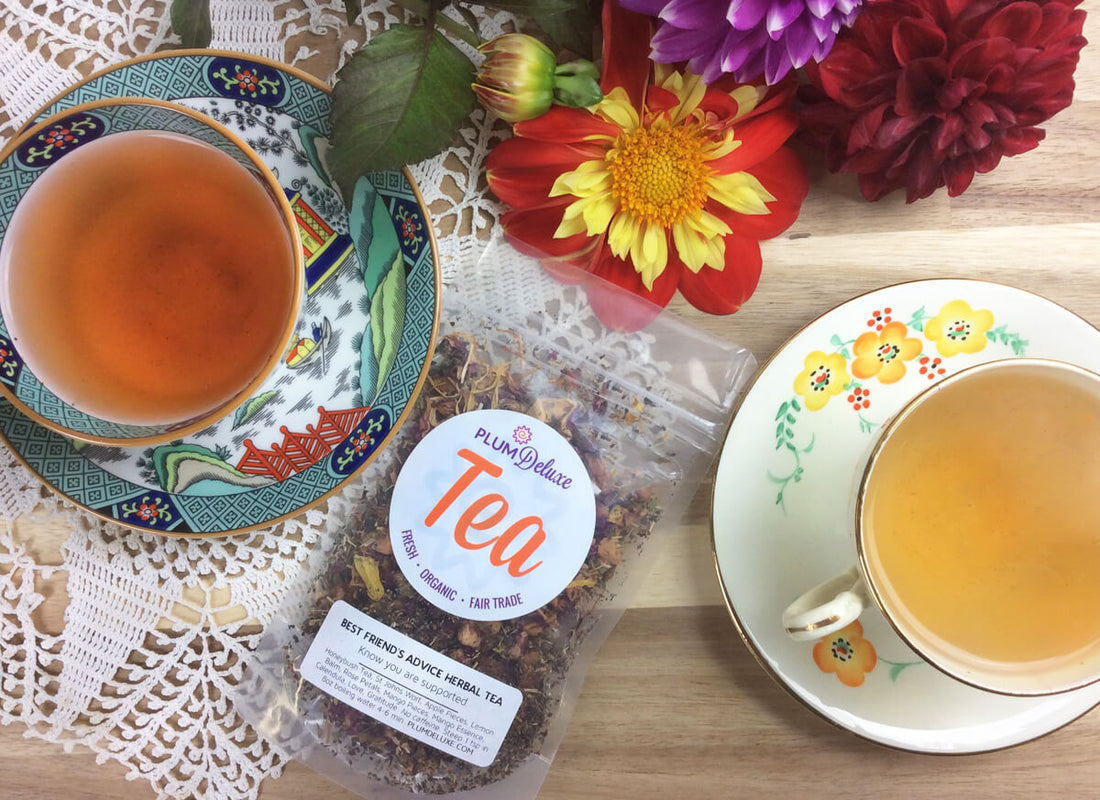
![Holiday Tea Variety Pack [6-Pack Variety of Flavors]](http://www.plumdeluxe.com/cdn/shop/files/holidayTeaVarietyPack.png?v=1759777907&width=165)


